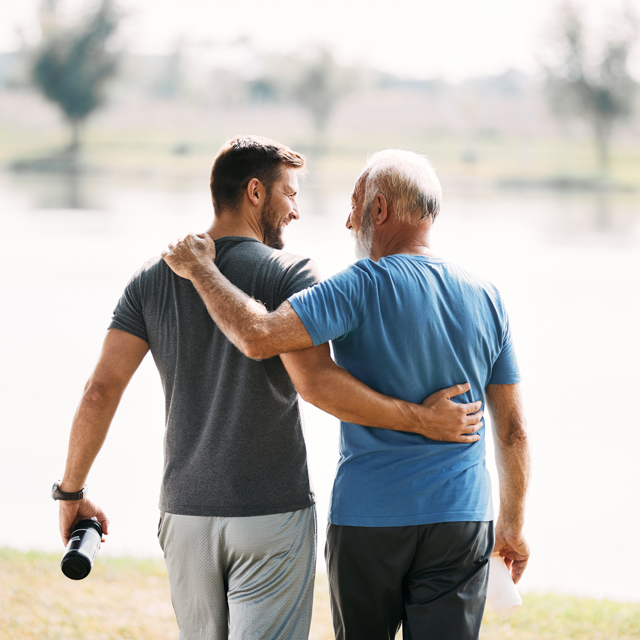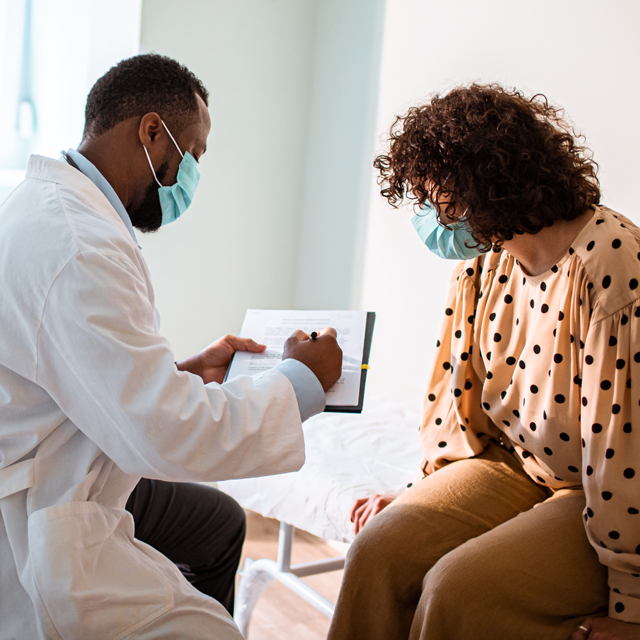Your body undergoes much stress and trauma when you’re living with cancer. Here, a dietitian and physical therapist share tips to help you stay strong and feel your best.
If you’re living with cancer and pursuing chemotherapy, radiation therapy or surgery to treat your cancer, you’re going to face side effects. And when you’re dealing with things like extreme fatigue, swelling, insomnia and nausea, the last things you may want to do are eat a healthy meal or get up and moving.
However, both are essential not only to your ability to manage side effects but also to your ability to recover from your disease.
Dan Thomas, a clinical dietitian at Vanderbilt-Ingram Cancer Center, and Carey Tomlinson, assistant manager of rehab services at Vanderbilt Dayani Center for Health & Wellness, know this well. Their work focuses on improving the health, wellness and outcomes of patients living with cancer and other chronic diseases. They understand the role that nutrition and fitness play in maintaining strength, endurance and mental wellbeing, both during and after treatment.
“Technology and science have improved greatly and outcomes are much better now, but there’s still the fact that many treatments are toxic,” Tomlinson said. “So anything we can do to help prevent side effects — whether that improves cardiovascular strength or sleep or what have you — we want to do that.”
Nutrition: How to maintain your weight during cancer treatment
“Throughout treatment, many symptoms interfere with a person’s ability to eat adequately,” Thomas said. “An individual’s need for calories and protein also increases. This can lead to malnutrition, which has been associated with decreased tolerance to cancer therapy, greater treatment toxicities and increased mortality.” If you’re struggling with your appetite or have experienced weight loss, here are some strategies to consider for living with cancer:
- Think small. When your appetite is low, it’s wise to consider how you can get the most nutrition bang for your buck. Thomas recommends trying a supplement like Boost, Ensure or a similar product that can be tolerated. Also, consider five smaller meals rather than three large meals.
- Incorporate healthy fats. “This can help keep weight on without sacrificing nutrition,” Thomas said. A few examples of healthy fats include walnuts, salmon, olive oil, avocados, flax and chia seeds.
- Consider plant-based foods. “Fruits, vegetables, nuts, beans and whole grains are strong sources of fiber and antioxidants, which can help deter the development of cancer,” Thomas said. These foods also make for great snacks. However, it is important to stick to your treatment plan and check with your provider to avoid any foods that may not fit in your plan.
- Know that maintaining weight and managing symptoms take priority. “Depending on the type of cancer and the type of symptoms the patient is experiencing, they may need to avoid typical ‘healthy foods,’” Thomas said. “While we want individuals to maintain a healthy diet throughout treatment, it is not always possible.”
- Enlist the help of a dietitian before you have significant weight loss or side effects. “Using your dietitian to help with symptoms as they arise, rather than finding a solution for multiple symptoms all at once, makes progress more manageable,” Thomas said. “Dietitians can help with a variety of symptoms that affect intake such as fatigue, taste changes, early satiety, nausea, diarrhea, constipation and bloating.”
Movement: The importance of exercise during cancer treatment
“We know that exercise and movement will increase the quality of life while going through cancer, but it can also help you beat cancer,” Tomlinson said. “If you’re not feeling great, if it’s a hard day, just walking around the house can help with strength and endurance. Exercise and movement also have psychological benefits, helping your emotions and mood, which we know can be affected when you’re going through cancer treatment.”
- Start out easy. “Doing even a little on those bad treatment days can help a lot,” Tomlinson said. “If all you can manage is sit-to-stands — where you sit on a couch or chair and move to a standing position, and repeat — that’s great! That’ll work your core, your glutes, your legs — all those muscles that have a tendency to get weak when we’re sitting more.”
- Try yoga. “I personally love encouraging my patients to do yoga — it will stretch everything, it will work your core, it will get you to focus on breathing and maybe even meditation,” Tomlinson said. “My mantra is ‘Pain Free’: If it hurts, don’t do it! If you follow that rule, yoga is a wonderful, gentle way to get your body moving.”
- Walk regularly and use your muscles. “Having a regular walking routine is a great way to maintain strength and get your exercise in during treatment,” Tomlinson said. “If you feel up to it, you can also try to incorporate simple strength-training exercises in your routine such as sit-ups, squats or lunges.”
- Remember your goals. “Your goals are ‘How do I feel, what are my emotions and can I start building my energy back up so I’m not feeling this horrible fatigue’ — it’s not to get you to keep up with the soccer mom at the Y,” Tomlinson said. “We just want to do everything we can to get you, at this point in your life, to feel the best you can.”

Personalized Care for Cancer
The Vanderbilt-Ingram Cancer Center offers the region’s most complete range of oncology care, from advanced imaging to team-based treatment options to genetic cancer medicine and the latest in therapies being studied in clinical trials. The National Cancer Institute designates Vanderbilt as a Comprehensive Cancer Center, the highest ranking by the world’s leading authority on cancer. Vanderbilt is the only such designated cancer center in the state of Tennessee that treats adults and children.




